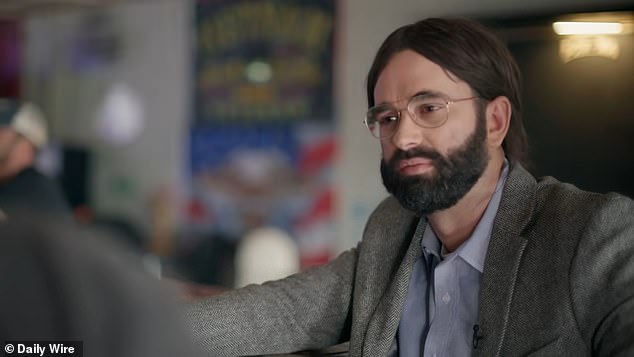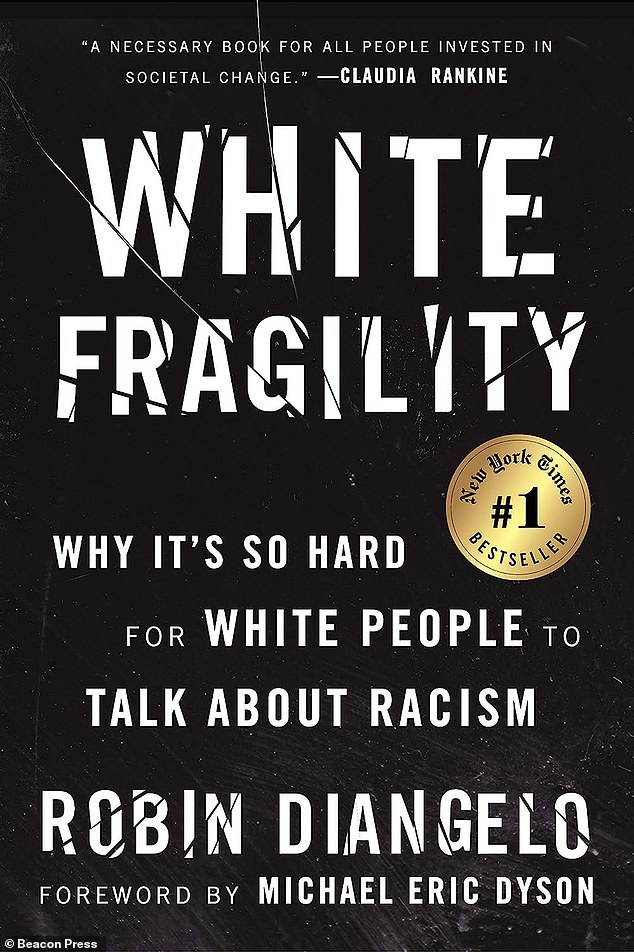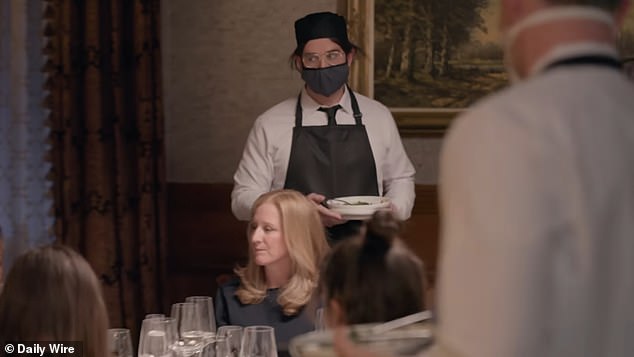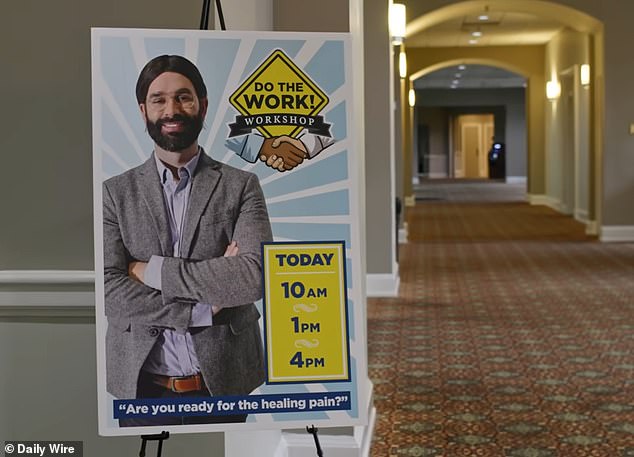How Matt Walsh exposed America’s top DEI expert as an ’empty vessel’ in his new movie, Am I Racist?
For rebellious filmmaker Matt Walsh, it’s the most striking scene in his new film, Am I a racist?
On one couch sits Walsh, a conservative hardliner, posing as a woke interviewer in an attempt to lift the lid on the diversity, equity and inclusion (DEI) industry.
Sitting across from him is Robin DiAngelo, the famed author of White Fragility, who made a fortune shaming white people for their inherent bigotry.
Over the next nine tense minutes, Walsh guides DiAngelo through a series of increasingly absurd scenarios in the name of defeating racism.
She doesn’t seem to be aware that she’s being scammed.
In a role-playing game, DiAngelo must atone for the sin of smiling “too much” at a minority colleague in an office hallway.
Walsh’s disguise allows him to interview Robin DiAngelo, the leading anti-racism expert who coined the term “white fragility.”
She is then confronted by Walsh’s producer, Ben, who is black, and asked to atone for the systemic racism.
She says, without irony, “On behalf of myself and my fellow white people, I apologize.”
Eventually, Walsh reaches into his own pocket and gives Ben a handful of dollars as “reparations.”
He then urges DiAngelo to do the same.
At first she is still a bit wary and calls a personal payment for slavery ‘very strange’.
But DiAngelo, caught up in the purity test, goes along with it.
She can “definitely go get some money,” she says.
She crosses the room, takes $30 from her designer bag and hands it to Ben, who sees the gesture as “small progress” in race relations.
It’s one of many painful, yet incredibly funny scenes in Walsh’s documentary, which portrays DEI and America’s obsession with race as a scam run by con artists and bigots.
DiAngelo—perhaps the most important DEI practitioner of our time—feels completely guilty.
Walsh, 38, told The Mail in an interview that it was easy to dismiss her as an “empty vessel”.
“Her own worldview is driving her into a corner,” he says.
“All I had to do was remind her.”
DiAngelo’s 2018 New York Times bestseller, White Fragility, argues that white people are less sensitive to racism and become defensive when confronted with it, when they should simply shut up and listen.

For his new documentary, Walsh went undercover as a budding DEI consultant wearing a herringbone jacket and a bun

Robin DiAngelo, author of the influential text White Fragility, is said to have plagiarized several scientists in her dissertation.

DiAngelo rose to prominence with the publication of her 2018 New York Times bestseller White Fragility: Why It’s So Hard for White People to Talk About Racism.
According to Walsh, DiAngelo had to follow her own rules.
The sketch shows “what it looks like when a white person takes on a totally submissive, apologetic role,” he says.
“You’re not allowed to have your own opinion. You just have to agree with what someone says who has more victim points than you.”
He concludes: ‘It looks humiliating and derogatory and at the same time very funny, but in a very dark way.’
The film’s Sept. 13 release caps a troubling month for DiAngelo, who still faces accusations of copying the work of two Asian-American colleagues for her dissertation.
The plagiarism accusation is particularly damaging for the 67-year-old, who has said he needs to give credit to the work of others, especially minorities who are often overlooked.
She did not respond to The Mail’s request for comment.
The remainder of Walsh’s 1 hour and 41 minute film entertains the viewer with parodies of anti-racism work.
They watch wilting liberals kick Walsh out of a workshop on “Grieving White Privilege” and wealthy white women pay top dollar to hear their black host declare, “This country isn’t worth saving.”
Walsh presents his DEI advisors as charlatans.
The workshop host, Breeshia Wade, charged him $30,000 for the session.
DiAngelo showed up for $15,000.

Walsh also appeared at the progressive dining club Race2Dinner, where white female guests pay thousands of dollars to be lectured on white supremacy.
Jodi Brown, who briefly rose to fame in 2022 by posting a video of her daughter and niece being brutally ignored by an entertainer at a parade, accepted $50,000 to support her “healing process,” he said.
“You would think they would want to talk about race and racism and not charge huge amounts of money for it,” Walsh says.
“That’s not true. They all want to get paid.”
The story is filled with counterarguments from ordinary Americans – both black and white – that convey the film’s main message: it’s best not to think too much about race and just treat everyone with kindness and respect.
The release marks a shift in Walsh’s media organization, The Daily Wire (DW).
The uncompromising medium has a loyal fan base, especially among young men, but unfortunately does not fit into America’s left-wing media landscape.
Am I Racist? is the first DW product to be released in regular cinemas throughout the Netherlands, with screenings at AMC, Regal and other major cinema chains.
According to Walsh, there have been no obstacles so far in bringing his provocative film to the attention of the popcorn-eating public.
That’s a far cry from his 2022 book, What is a Woman?, in which he attempted to debunk transgenderism.
At the time, Walsh was vilified as an “extremist” and “transphobe” for challenging the idea of gender identities.
It struggled to reach a wide audience until Elon Musk touted it on his X platform in June 2023.

The film’s highlight is Walsh, in his alter ego, giving a workshop in which he introduces white participants to “healing pain.”
According to Walsh, the “corporate media” is happy for conservative content to remain on their own platforms and only be viewed by “right-wing types.”
The mainstream release of Am I Racist could prove to be a problem.
He adds that it will “attract a lot more attention, probably in a negative way.”
“We’ll see what happens.”
This raises the difficult question of where Walsh goes next.
In his first two films, he satirized two of the most sacred movements in liberal America: transgenderism and DEI.
The other issues he discusses on The Matt Walsh Show are even more conservative.
The father of six is strongly against abortion and believes that marriage is for procreation, not gay couples.
This led to a notably uncomfortable conflict with podcaster Joe Rogan, as Walsh struggled to defend his positions.
Walsh’s first two films may be provocative, but they still focus firmly on the political center.
Polls show that most Americans are skeptical of transgenderism. Even many liberals oppose racial hiring in the U.S. corporate world.
This does not apply to access to abortion and gay marriage, for which there is overwhelming public support.
Will Walsh make a satirical foray into ending pregnancies or same-sex relationships?
At the moment the answer appears to be no.
“They seem much harder to translate into funny comedy and satire,” Walsh told The Mail.
